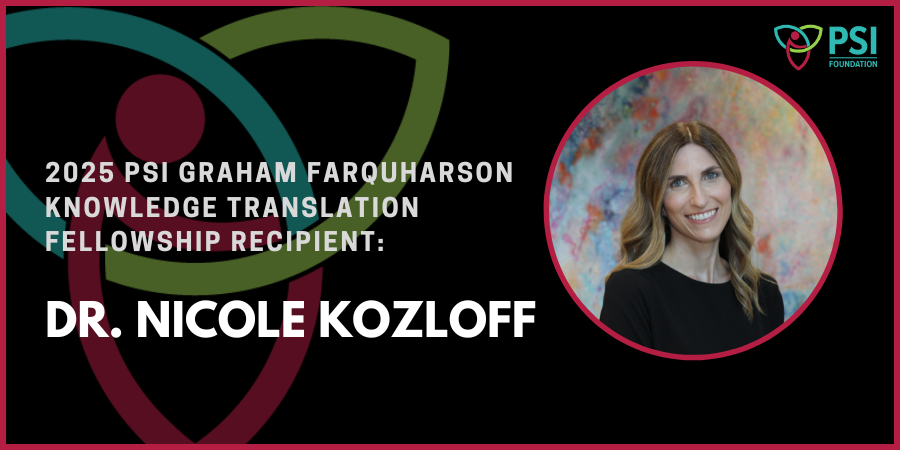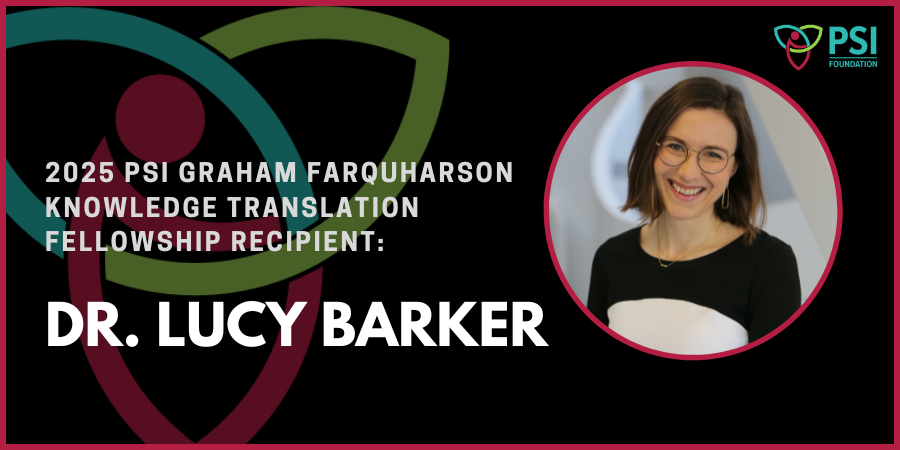“Despite the significant burden of mental health challenges among youth in Canada, only a minority access appropriate services. This is true even for the subset of youth who have particularly complex needs, as there are few evidence-based, implementable interventions designed for them. My research engages service users and providers to adapt interventions for youth with complex mental health needs and evaluate them. By considering implementation from the outset, we can connect youth with the treatment that best meets their needs earlier in the course of illness and improve their outcomes.” – Dr. Nicole Kozloff
PSI Foundation is pleased to announce Dr. Nicole Kozloff as the recipient of the 2025 PSI Graham Farquharson Knowledge Translation Fellowship.
About Dr. Nicole Kozloff
Dr. Nicole Kozloff is a scientist, child and adolescent psychiatrist and the co-director of the Slaight Family Centre for Youth in Transition at the Centre for Addiction and Mental Health (CAMH). She is also an associate professor in the Department of Psychiatry and the Institute of Health Policy, Management and Evaluation at the University of Toronto.
Dr. Kozloff’s research aims to improve the accessibility and effectiveness of services for youth with complex mental health needs and their families. To date, she has been awarded over $14,000,000 in research funding as Principal Investigator (PI) or co-PI. Having benefitted from support and guidance from mentors, she has contributed to several mentorship activities for junior psychiatrists and other scientists, and recently received the CIHR – CPA Glenda M. MacQueen Memorial Career Development Award for Women in Psychiatry.
About the PSI Graham Farquharson Knowledge Translation Fellowship
Knowledge translation research aims at transitioning research discoveries to the real world to improve health outcomes. The PSI Graham Farquharson Knowledge Translation Fellowship – valued at $300,000 for over two or three years – helps protect a promising new clinician investigator’s research time, allowing the Fellow to undertake high-impact translational research in Ontario.
Dr. Kozloff highlights the significance of salary support awards for physician researchers at the early career level.
“Thoughtfully designing research and authentically engaging with end users to improve our health system takes time, yet there are so few opportunities for salary support for early-career physician researchers. The PSI Graham Farquharson Knowledge Translation Fellowship is a rare example of an award that protects the time of physician researchers from the other demands of their busy careers. This allows physician researchers to apply their unique combination of clinical and scientific expertise to help bring research innovations to the real work.”
Fellowship Funds to be Used to Improve the Outcomes for Youth with Complex Mental Health Needs
A subset of Canadian youth has “complex” mental illness, with a major impact on functioning, extensive use of services, multiple mental or physical health conditions, or challenges related to the social determinants of health. For youth with psychosis, early psychosis intervention (EPI) programs are effective in research settings, but quality of care in real-world settings is inconsistent, and outcomes vary by the social determinants of health—they need structures and processes to support consistent, high-quality EPI service delivery, explicitly designed to address equity gaps. For youth with complex mental health needs other than psychosis, few well-articulated models of care exist, and promising practices are not always rigorously evaluated or spread beyond single settings—they need evidence-based, youth-friendly models informed by those with lived experience, addressing a broad range of needs, that can be implemented across different settings.
This Fellowship aims to implement the NAVIGATE model of coordinated specialty care, digitizing it to support training and uptake, incorporating processes to address the social determinants of health, and adapting it for youth with other complex mental health needs. These projects bring the evidence-based NAVIGATE model to the real world to improve outcomes for youth with the greatest mental health burden.



